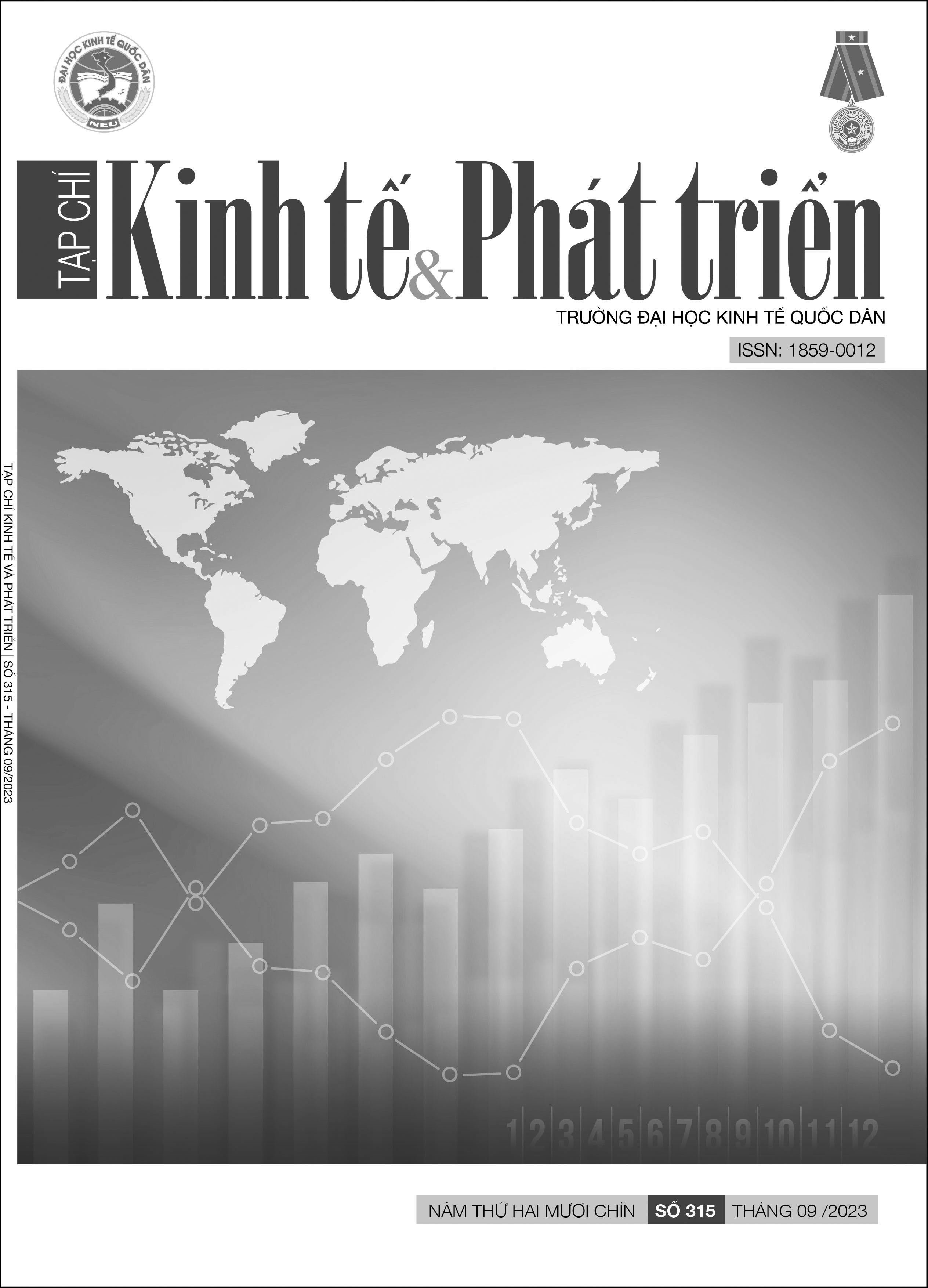Ảnh hưởng của lãnh đạo phụng sự tới hành vi đổi mới của nhân viên trong các công ty công nghệ thông tin ở Việt Nam: Vai trò trung gian của động lực nội tại
DOI:
https://doi.org/10.33301/JED.VI.1177Từ khóa:
Hành vi đổi mới, động lực nội tại, lãnh đạo phụng sựTóm tắt
Nghiên cứu này tập trung xem xét ảnh hưởng của lãnh đạo phụng sự đến hành vi đổi mới trong các công ty công nghệ thông tin Việt Nam. Kết quả khảo sát 450 nhân viên hiện đang làm việc trong các công ty công nghệ thông tin Việt Nam năm 2023 chỉ ra rằng hành vi lãnh đạo phụng sự của cán bộ quản lý thúc đẩy hành vi đổi mới của nhân viên thông qua tăng cường động lực đổi mới sáng tạo của nhân viên. Khi nhà quản lý quan tâm đến sự phát triển nhân viên, tạo điều kiện cho nhân viên sáng tạo, nhân viên sẽ có động lực tìm kiếm phương pháp và ý tưởng mới, từ đó sẽ có hành vi đổi mới trong công việc. Dựa trên kết quả này, nhóm tác giả đề xuất một số giải pháp nhằm thúc đẩy hành vi đổi mới của nhân viên.
Tài liệu tham khảo
Anderson, N., Potočnik, K. & Zhou, J. (2014), ‘Innovation and creativity in organizations: a state-ofthe-science review, prospective commentary, and guiding framework’, Journal of Management, 40(5), 1297-1333.
Bande, B., Fernández-Ferrín, P., Varela-Neira, C. & Otero-Neira, C. (2016), ‘Exploring the relationship among servant leadership, intrinsic motivation and performance in an industrial sales setting’, Journal of Business and Industrial Marketing, 31(2), 219-231.
Baron, R.M. & Kenny, D.A. (1986), ‘The moderator–mediator variable distinction in social psychological research: Conceptual, strategic, and statistical considerations’, Journal of Personality and Social Psychology, 51(6), 1173-1182.
Blau, P.M. (1964), Exchange and power in social life, New York: Wiley.
Gupta, V. (2020), ‘Relationships between leadership, motivation and employee-level innovation: Evidence from India’, Personnel Review, 49(7), 1363-1379.
Hair, J.F., Black, W.C., Babin, B.J. & Anderson, R.E. (2019), Multivariate data analysis, 8th edition, Cengage Learning.
Iqbal, A., Ahmad, M.S. & Nazir, T. (2023), ‘Does servant leadership predict innovative behaviour above and beyond transformational leadership? Examining the role of affective commitment and creative self-efficacy’, Leadership & Organization Development Journal, 44(1), 34-51.
Janssen, O. (2000), ‘Job demands, perceptions of effort-reward fairness and innovative work behaviour’, Journal of Occupational and Organizational Psychology, 73(3), 287-302.
Janssen, O. (2005), ‘The joint impact of perceived influence and supervisor supportiveness on employee innovative behavior’, Journal of occupational and Organizational psychology, 78(4), 573-579.
Khan, M.M., Mubarik, M.S., Islam, T., Rehman, A., Ahmed, S.S., Khan, E. & Sohail, F. (2022), ‘How servant leadership triggers innovative work behavior: exploring the sequential mediating role of psychological empowerment and job crafting’, European Journal of Innovation Management, 25(4), 1037-1055.
Khan, Z., Shahzad, F., Qureshi, J.A. & Ahmed, S. (2020), ‘Servant leadership and innovative work behavior: The mediating role of psychological empowerment’, Journal of Business Research, 117, 276-287
Liden, R.C., Wayne, S.J., Liao, C. & Meuser, J.D. (2014), ‘Servant leadership and serving culture: Influence on individual and unit performance’, Academy of Management Journal, 57(5), 1434-1452.
Liden, R.C., Wayne, S.J., Zhao, H. & Henderson, D. (2008), ‘Servant leadership: Development of a multidimensional measure and multi-level assessment’, The Leadership Quarterly, 19(2), 161-177.
Malik, S. (2022), ‘Emotional intelligence and innovative work behaviour in knowledge-intensive organizations: how tacit knowledge sharing acts as a mediator?’, VINE Journal of Information and Knowledge Management Systems, 52(5), 650-669.
Mcquade, K.E., Harrison, C. & Tarbert, H. (2021), ‘Systematically reviewing servant leadership’, European Business Review, 33(3), 465-490.
Nguyen, N.P. & McGuirk, H. (2022), ‘Evaluating the effect of multifactors on employee’s innovative behavior in SMEs: mediating effects of thriving at work and organizational commitment’, International Journal of Contemporary Hospitality Management, 34(12), 4458-4479.
Oldham, G.R. & Cummings, A. (1996), ‘Employee creativity: Personal and contextual factors at work’, Academy of Management Journal, 39(3), 607-634.
Parris, D.L. & Peachey, J.W. (2013), ‘A systematic literature review of servant leadership theory in organizational contexts’, Journal of Business Ethics, 113(3), 377-393.
Ryan, R.M. & Deci, E.L. (2017), Self-determination theory: Basic psychological needs in motivation, development, and wellness, New York: Guilford Press.
Scott, S.G. & Bruce, R.A. (1994), ‘Determinants of innovative behavior: A path model of individual innovation in the workplace’, Academy of Management Journal, 37(3), 580-607.
Shailja, S., Kumari, P. & Singla, H. (2023), ‘Impact of servant leadership on innovative work behaviour: a moderation mediation analysis’, Leadership & Organization Development Journal, 44(3), 330-349.
Su, W., Cheng, B.S., Chou, L.F., Wu, C.H. & Kan, S.H. (2020a), ‘Servant leadership and innovative behavior: Interactive effects of psychological safety and psychological contract breach’, Personnel Review, 49(5), 1088-1106.
Su, W., Lyu, B., Chen, H. & Zhang, Y. (2020b), ‘How does servant leadership influence employees' service innovative behavior? The roles of intrinsic motivation and identification with the leader’, Baltic Journal of Management, 15(4), 571-586.
Tierney, P., Farmer, S.M. & Graen, G.B. (1999), ‘An examination of leadership and employee creativity: The relevance of traits and relationships’, Personnel psychology, 52(3), 591-620.
Van Dierendonck, D. (2011), ‘Servant leadership: A review and synthesis’, Journal of Management, 37(4), 1228-1261.
Wang, Z., Meng, L. & Cai, S. (2019), ‘Servant leadership and innovative behavior: A moderated mediation’, Journal of Managerial Psychology, 34(8), 505-518.
Woodman, R.W., Sawyer, J.E. & Griffin, R.W. (1993), ‘Toward a theory of organizational creativity’, Academy of Management Review, 18(2), 293-321.
Yidong, T. & Xinxin, L. (2012), ‘How ethical leadership influence employees’ innovative work behavior: a perspective of intrinsic motivation’, Journal of Business Ethics, 116(2), 441-455.





